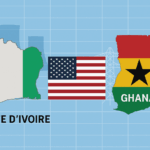
Internally, Côte d’Ivoire continues to grapple with democratic challenges, but internationally, its growing geopolitical influence in the cocoa and coffee trade is strengthening its position. This leverage is attracting foreign direct investments and bilateral deals that are fueling expansions in road infrastructure and energy.
The country’s qualification for a new phase of the Millennium Challenge Corporation (MCC) compact demonstrates the resilience of its economy and its attractiveness to global investors. Just this week, the United States marked two milestones in Abidjan: the closeout of a $536.7 million transport and workforce development compact and the signing of a new $300 million regional energy compact.
The Ivorian compact has been hailed as a model of how U.S. government investments can deliver mutually beneficial results. The new regional compact is expected to further this trajectory by unlocking efficiency in the energy sector, driving fresh investments, creating jobs, and strengthening regional trade integration.
Since its creation in 2004, the MCC has invested more than $10 billion in 24 African countries, contributing to over 26 million megawatt-hours of electricity supply across the continent. Côte d’Ivoire, West Africa’s second-largest economy after Nigeria, still struggles with access to electricity at around 73 percent—far behind Ghana’s nearly 90 percent coverage.
The focus of the new MCC agreement on energy is therefore critical, especially as Abidjan positions itself to expand cocoa processing, an energy-intensive industry.
Côte d’Ivoire exports between 200,000 and 300,000 metric tons of cocoa to the United States annually, according to the Coffee and Cocoa Council (CCC). This is about half of Ghana’s average annual production in the last two years. Analysts suggest that this new deal could grant the U.S. even more strategic access to Ivorian cocoa beans at a time when global prices are rising due to tightening output.
Already, China’s presence in Abidjan is compelling Washington to have a rethink about their investment in Ivory Coast. The Chinese government advanced US$199.9 million to build the plants inCôte d’Ivoire, with each intended to have an annual processing capacity of 50,000 tonnes (55,100 tons).
The company also agreed to build cocoa warehouses in each location, with storage capacity of 140,000 tonnes and 160,000 tonnes. In return, 40 per cent of the output from the two processing plants would be sold to Chinese companies.
While Abidjan consolidates its gains, Accra finds itself sidelined. Ghana, the world’s second-largest cocoa producer and Africa’s top gold exporter, lost access to MCC funding in 2019.
The setback followed the cancellation of a concession agreement between the Electricity Company of Ghana (ECG) and Power Distribution Services (PDS), a key component of its $316 million Ghana Power Compact signed in 2014 under then-President John Dramani Mahama.
The U.S. Embassy has recently reaffirmed its willingness to support Ghana in renegotiating access to a $190 million tranche of the compact, which was intended to reform the country’s electricity distribution sector.
However, Accra still faces an uphill battle in regaining MCC confidence at a time when its neighbour Côte d’Ivoire is surging ahead with new energy partnerships and strengthening its role in global cocoa supply chains.